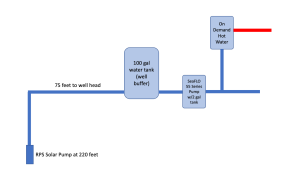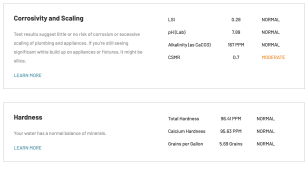ezwryder
New Member
I am trying to figure out if I have a generally-correct set of components for an off-grid cabin water system. I don't think it needs to be complicated, but I haven't worked with a plumbing system before. If you have experience with these types of systems, your input would be appreciated.
Our needs are simple; decent water pressure for a sink, shower and a toilet. Right now our toilet is a 5 gallon bucket and the shower is a Joolca. Expectations are not high, just about anything would be better!
The well is currently plumbed with a windmill driven pump, which I will continue to use for now. Later I'd like to install a solar-driven pump with a low water level switch that can auto-refill the tank.
The pump and accumulator are the style used in RV systems, and I figured this is basically an RV/marine-type system.
Hot water would come from a propane instant water heater.
Does this look relatively on track, or would you do things differently? Use different components or different-sized components?
Thank you.
Our needs are simple; decent water pressure for a sink, shower and a toilet. Right now our toilet is a 5 gallon bucket and the shower is a Joolca. Expectations are not high, just about anything would be better!
The well is currently plumbed with a windmill driven pump, which I will continue to use for now. Later I'd like to install a solar-driven pump with a low water level switch that can auto-refill the tank.
The pump and accumulator are the style used in RV systems, and I figured this is basically an RV/marine-type system.
Hot water would come from a propane instant water heater.
Does this look relatively on track, or would you do things differently? Use different components or different-sized components?
Thank you.





